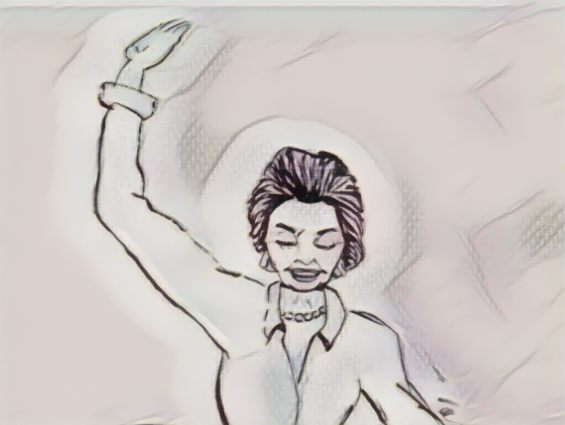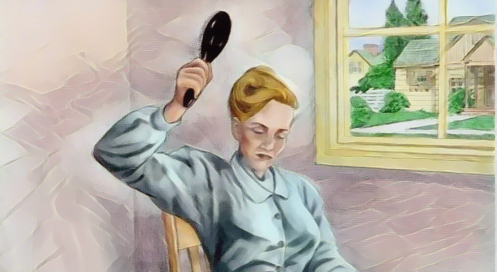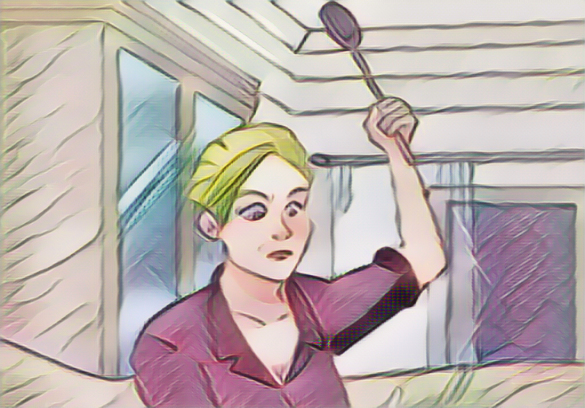My dormitory was a long, chilly room lined with iron beds, each one occupied by a boy with a mop of hair and a fondness for mischief. There were twenty of us, all told, huddled beneath scratchy blankets, our breath misting in the morning air. Watching over us was Miss Margaret, the so-called “house mother,” whose presence was as bracing as a cold bath. With so many boys together, trouble was as certain as muddy knees, and the rules were enforced with a kind of unwavering efficiency, both in class and after hours.
In the classroom, minor offences—speaking out of turn, ink blots on the desk—were met with lines. “I must not fidget,” “I will not flick paper pellets,” and so on, until your hand ached. But for more serious misdeeds, it was the cane: four or six sharp strokes, delivered with precision by Mr. Arthur, the headmaster, whose aim was as true as a cricketer’s. The sting faded quickly, but the memory lingered, especially when you tried to sit down at breakfast.
The ritual of the caning was as solemn as a church service. When your name was called, you would march to Mr. Arthur’s study, holding a folded note from your teacher. There, in the quiet of that book-lined room, you would be told to bend over and grip the edge of his desk, preparing yourself for the swish and crack of the cane. It was never personal—simply the way things were done.
Miss Margaret, for all her title, was about as motherly as a sergeant major. Tall, thin, and always dressed in starched blouses, she moved through the dormitory like a ship’s captain, her eyes sharp for any sign of disorder. I doubted she had ever had children of her own, and she seemed to take a certain pride in keeping us in order. Her lips rarely curved into a smile, and her gaze could stop a boy in his tracks.
She kept a little black notebook, in which she recorded every minor infraction—whispering after lights out, a bed left untidy, shoes covered in mud. Each offence earned a neat black tick, and three ticks meant a visit from the slipper. The system was as precise as the school clock, and we all lived in fear of seeing our names in Miss Margaret’s ledger.
The slipperings were carried out with a kind of solemn ceremony. Miss Margaret’s sitting room, a tidy little space just off the dormitory, was the scene of our reckoning. When summoned, you would be told to grip the end of your bed, while she delivered a series of brisk, stinging smacks to the seat of your shorts—ten, usually, each one as sharp as the last.
For more serious offences, however, you would be called into her sitting room proper—a place we entered with hearts thumping. The embarrassment was almost worse than the pain. There, behind the closed door, Miss Margaret would settle herself in her favourite chair, set her jaw, and administer a smacking that seemed to go on forever. Even with the door shut, the sound of each slap and the muffled cries would drift through the dormitory, a warning to all.
I must confess, I was no stranger to the slipper. More than once, I found myself blinking back tears as I crept back to my bed, the sting in my back a sharp reminder to mind my manners. Still, the slipper was almost bearable—a quick ordeal, soon over. It was the summons to Miss Margaret’s sitting room that truly filled me with dread.
My first such summons came one evening, just as the last rays of sunlight slipped through the window and the dormitory settled into the hush before “lights out.” I had washed, brushed my teeth, and was lying on my bed, thinking of home, when Miss Margaret appeared in the doorway. Her voice, crisp as autumn leaves, called out my surname. My heart sank. I knew at once I was in trouble.
The charge, apparently, had been brought by one of the canteen ladies, Mrs. Dorothy, who claimed I had refused to finish my dinner and had been, in her words, “insolent.” I could not remember being especially rude, but arguing was out of the question. Miss Margaret’s word was law, and I followed her, trembling, into her room.
She took me firmly by the arm and led me to a straight-backed chair, her grip unyielding. Sitting down, she fixed me with a look that allowed for no nonsense and told me to Prepare myself. I did as I was told, cheeks burning, hardly daring to look up.
(pause) The room was silent except for the faint ticking of the mantel clock and the distant shuffling of boys settling into their beds. The air felt thick, heavy with anticipation and the scent of lavender polish. Miss Margaret’s chair creaked as she shifted, her face set in a mask of stern resolve. My heart beat quickly in my chest, each beat echoing in my ears as I stood before her, feeling impossibly small and exposed. (short pause) She cleared her throat, her voice cutting through the tension: “Children must learn to respect their elders,” she declared, her tone as clear and cold as the school pond in winter. “This is what happens when they do not.” (pause: 0.3s) With that, she pulled me gently but firmly across her lap, my bare legs dangling awkwardly, my palms pressed to the worn rug beneath. (pause)
(pause) The first smack landed with a sharp, echoing crack, surprising me more than it hurt. But the next came swiftly, and the next, each one stinging more than the last. The slipper’s rubber sole left a hot, tingling feeling on my skin, and I squeezed my eyes shut, determined not to cry. (pause) The rhythm was steady—smack, pause, smack, pause—each one marked by the faint intake of Miss Margaret’s breath and the soft rustle of her skirt. (short pause) I could hear the faintest sounds from the dormitory: a bed creaking, a muffled gasp, the hush of boys listening in fearful awe. (pause) My own breath came in ragged bursts, and with each new slap, the pain grew, spreading outward until it seemed to fill the whole room. (pause: 0.3s) I whimpered, then cried out, unable to hold back the tears any longer. They ran down my cheeks, hot and shameful, as Miss Margaret continued, her arm steady, her face unreadable. (pause)
(pause) The atmosphere was thick with tension, the air charged with the knowledge that this was a lesson meant to be remembered. Miss Margaret’s discipline was never cruel, but it was thorough—each smack a reminder of the rules, each pause a moment to let the lesson settle in. (pause) I could sense her resolve, the way she believed in the necessity of this ritual, and yet there was no unkindness in her actions—only a sense of duty. (pause) The slippering seemed to go on forever, time stretching and warping until I lost count of the blows. My sobs grew louder, echoing off the walls, mingling with the faint sounds of the other boys’ anxious whispers outside the door. (pause) At last, after what felt like an eternity, Miss Margaret stopped. She rested her hand on my back for a moment, as if to steady me, then quietly told me to stand and pull up my pyjamas. (pause)
(pause) When it was over, I was sent straight to bed, my back throbbing and my face streaked with tears. I lay awake for a long time, listening to the gentle snores of the other boys, the memory of that evening etched forever in my mind. It was not the last time I would find myself in Miss Margaret’s sitting room, but it was the first—and, even now, the most vivid






